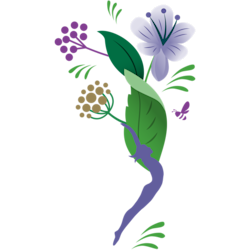

Pitta autumn wellbeing guide
Everyone has a combination of all three constitutional dosha, but one of them is usually primary, one secondary and the third less prominent. Thus each person has a particular pattern of physical characteristics that make up their individual constitution known as ‘prakriti’. If you look at any current imbalances in your health, known as ‘vikriti’, you can help to correct this imbalance by choosing the correct food, herbs or yoga posture for you.
Pittatypes are at most risk of being tipped out of balance in the hotter months of late spring and summer. As the temperature begins to slowly drop, the cool autumn air can often help balance your typically hot and fiery pitta types. Autumn is a good season for the pitta dosha allowing them to release some of the excess pitta accumulated during the hot summer months.
When pitta is in balance it embodies good health. It brings a healthy appetite and thirst, hormonal balance, courage and flexibility, glowing complexion and a strong sense of wellbeing.
Signs of increased pitta include an aversion to heat, a sour or bitter taste in the mouth, loose bowels, and red, flushed skin. They may also experience heartburn, high blood pressure, skin rashes, and hot flushes. Emotionally, a pitta may become angry, frustrated and irritated. During the autumn months the risk of a pitta becoming tipped out of balance is more likely to be influenced by high emotions or stress-fuelled environments as opposed to climatic and seasonal changes.
You can balance pitta’s intense, volcanic nature with the opposing qualities of calm and moderation. In particular, not skipping meals, and favouring ‘cooler’ foods, as well as spending time laughing every day and getting out and about amongst the natural world. Allow the brisk Autumnal winds to whip away any irritation and stress.
Those with a dominant pitta dosha will benefit from allowing time and space for the body and mind to find cool and calm. However, be cautious of adding in too many cooling foods; bear in mind that the climate is naturally cooler and that your body will need to start ‘storing’ nutrition for the Winter months ahead.
Top tips for those with a dominant pitta dosha
Favour foods that are sweet, bitter or astringent and, therefore, more cooling
Reduce foods that are spicy, salty or sour and avoid pungent foods - all of which will encourage heat and only build on the heat accumulated during the summer months
Avoid stimulants, dairy and highly fatty or processed foods (these take more energy to break down and pressurise the digestive system)
Practice exercises that are cooling, regulating and balancing. For a pitta these can be Moon Salutations and shoulder stands
Herbs to help calm the fire of pitta are those that are characteristically cooling, calming and anti-inflammatory. Pukka teas such as Three Mint and Peppermint & Licorice. Remember that you want to help to body release excess heat without causing it to become too cold, so during the autumn months Pitta types can tolerate slightly warmer but anti-inflammatory herbs such as turmeric and fennel; try Pukka's Turmeric Active and Three Fennel tea.
Don't know your dosha? Take our dosha quiz to find out.

Author: Sebastian Pole
Co-founder and Master herbsmith
Pukka’s Co-founder and Master Herbsmith keeps a close eye on the formulation of our organic creations. Sebastian has been in clinical practice since 1998 using a blend of Ayurvedic, Chinese and Western herbal medicine and has pioneered organic and FairWild practitioner-grade herbs as the norm at Pukka.
Qualifications
Degree in Hindi and Indian Religions, a registered yoga therapist
Years of experience
23 years in clinical practice
Professional registrations
Member of the Ayurvedic Practitioners Association, Register of Chinese Herbal Medicine and the Unified Register of Herbal Practitioners, Fluent in Hindi.
